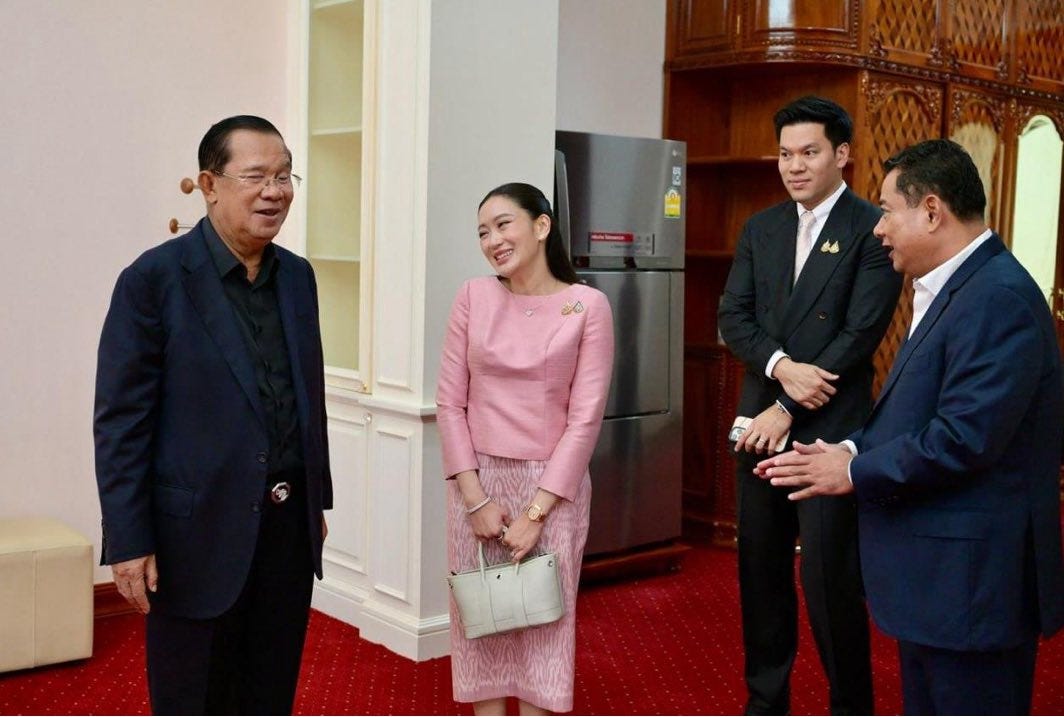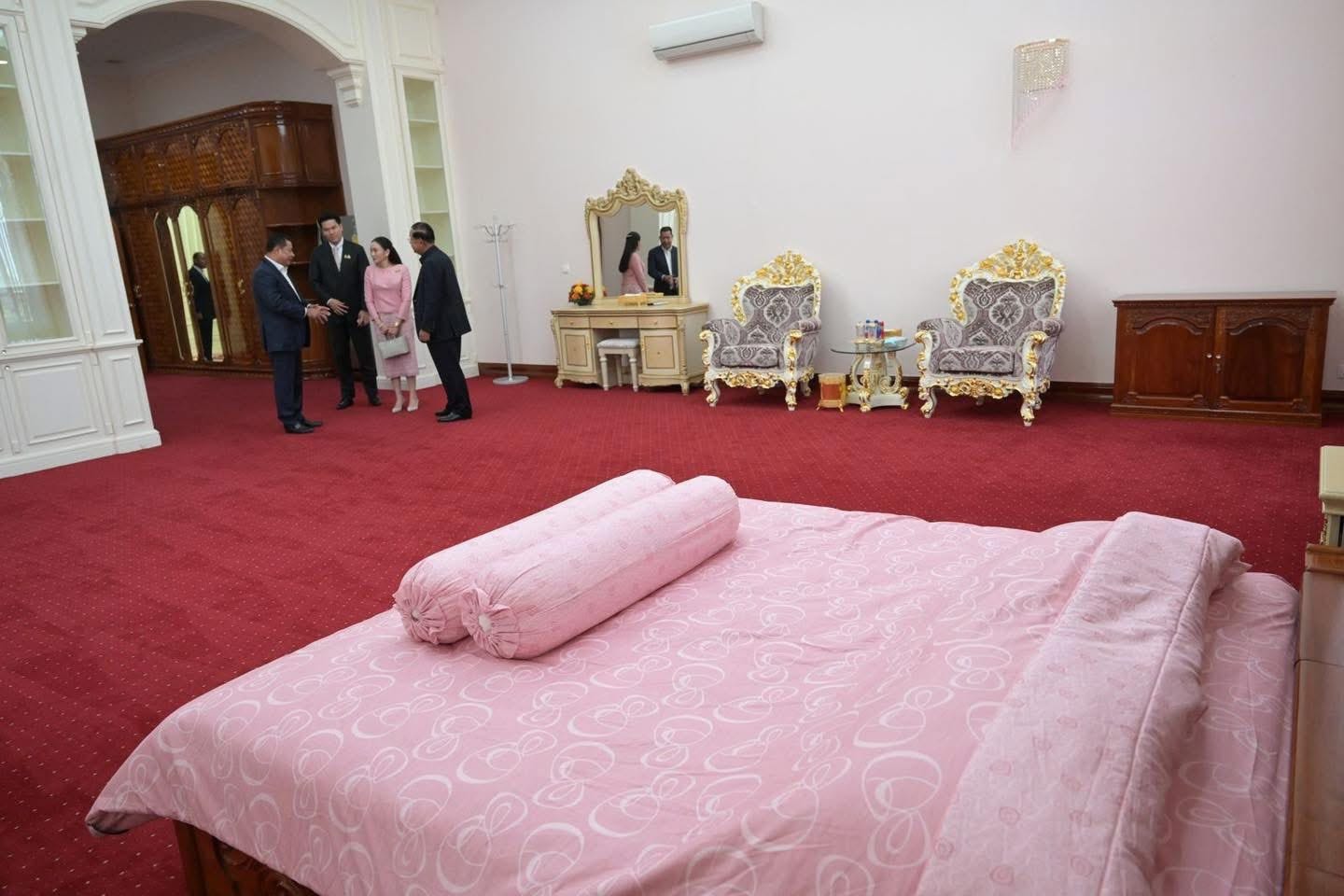Hun Sen Issues a Veiled Threat
The "Thaksin Room" puts the Shinawatras on notice

Compared to the past few days, the third day of the government’s crisis of faith has been less quiet. Prime Minister Paetongtarn Shinawatra spent the day visiting the 2nd Army Base and apologizing to its commander. We still have no confirmation of how the discussions between the United Thai Nation Party and Pheu Thai have gone, although we now have confirmation from party executive member Juti Krairiksh that the party did indeed vote to leave the coalition if Paetongtarn Shinawatra refuses to resign. Meanwhile, the loyalist coalition members are telegraphing confidence. Pai Lik, the secretary-general of the Kla Tham party, said that the coalition has “263++” MPs; in another interview he said they may have up to 280 MPs. This number for now is unverifiable.
Almost as if he feared that things would be insufficiently dramatic, Cambodia’s de facto leader Hun Sen made another move. He decided to release photos from Paetongtarn’s visit to Cambodia back in April 2025, where he said the prime minister asked to see the rooms in which former prime ministers Thaksin Shinawatra and Yingluck Shinawatra stayed during their periods of self-exile abroad. Hun Sen tweeted:
During the official visit of the Thai Prime Minister to Cambodia in April 2025, aside from the official agenda, we also had a family gathering, where the Thai Prime Minister Ung Ing and her husband dined at my residence.
Before departing, the Thai Prime Minister requested to see the rooms where her father and aunt had once stayed. My house had preserved two rooms for them. One was named the "Thaksin Room" and the other the "Yingluck Room." The Thai Prime Minister’s husband took photographs and videos of both rooms.
Over 30 years of heartfelt bonds between our two families were shattered by the leak of a phone conversation by a Cambodian official, who was angered by insults directed at me and the Cambodian Prime Minister, claiming we were unprofessional.

This is not a scandal in and of itself. (I will say, however, that the room’s decor is highly dubious and should be a scandal among interior designers). But in the context of the tensions between the two countries and the deterioration in the relationship between the Shinawatras and Hun Sen, an important message is being sent.
Hun Sen makes clear from this image that the “30 years of heartfelt bonds” between the two families were so strong to the extent that he would preserve the two rooms in which they had stayed in his house and rename them the “Thaksin room” and “Yingluck room.” Their close relationship is well documented and not surprising, but coming so close after the leaked phone call, it reinforces perceptions that this relationship was too close for comfort. At a time when Paetongtarn is being heavily criticized for her relationship with “Uncle” Hun Sen, this was not a reminder that she would have wanted being sent to the Thai people.
Even more importantly, Hun Sen’s post made it clear that he has a steady drip-drip-drip of content ready to go. In a sense, it feels like Hun Sen — a man of keen political cunning who has survived for decades in cut-throat Cambodian politics to become Asia’s longest-serving leader — is blackmailing top leaders in the Thai government. Hun Sen appears to be signaling to the Shinawatras that he has all this information and that he can put this out for the world to see at any moment.1 (It’s worth pondering whether there were any listening devices or cameras installed in those rooms.) This image may be relatively innocent, but a menace lurks underneath: other materials in his possession are unlikely to be so pristine. So far we know of one politically explosive call between Paetongtarn and Hun Sen which brought her government to the brink of collapse. What else could Hun Sen be waiting to release?
Many Thais may come to the same conclusion as what the veteran journalist Suthichai Yoon wrote: “If Thailand is to deal with Hun Sen, there can no longer be any Shinawatras in office, because Thaksin and Paetongtarn can be blackmailed at any moment.” One also begins to wonder what sort of dirt Hun Sen has on other politicians as well. The commentator Pongprom Yamarat speculated that Hun Sen’s actions were also a “message to other groups of Thai politicians…which has interests in grey Cambodian capital.”
And let’s remind ourselves that Hun Sen is exactly the sort of unpredictable figure who would not be shy about providing an outlet to his anger. As Sebastian Strangio wrote in his book Hun Sen’s Cambodia: “Hun Sen’s keen intellect was matched by an equally combustible temper. In the early years he went everywhere armed, and reputedly shot out an air-conditioning unit in a fit of rage during a cabinet meeting in the early 1980s.” Who knows what fits of rage, or other calculations, are driving Hun Sen now? Is there something he wants from the Thai government that he is not getting? Is this simply a play for domestic popularity? Both? Something else? We do not know for sure. But regardless of the reason, should more be coming from Hun Sen, Thais will, rightly so, be more focused on the contents of what he releases. Attempts to redirect popular fury towards the diplomatic norms being broken by Cambodia can only go so far.
For this reason, my instinct remains that Paetongtarn’s premiership remains on life support. The majority of government MPs have decided to continue backing the prime minister. But the government is completely at the mercy of Hun Sen’s whims. One audio recording was enough to necessitate days of frantic damage control. If something else drops — perhaps even a video — that proves even more fury-inducing, the crisis of faith will only deepen and the political pressure may truly be impossible to withstand.
His claim that the voice call was leaked by an angry Cambodian official obviously does not pass the smell test.


For Hun Sen, the sky is the limit when he's angry at someone. Still trying to figure out what's in it for him to blow up his relationship with the Shinawatras.
Thanks Ken for all the updates. Exciting stuff, just pray it doesn't end in a coup